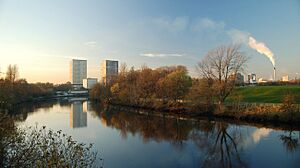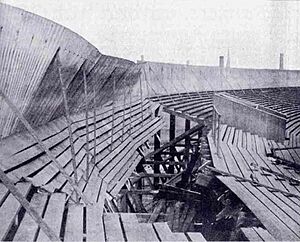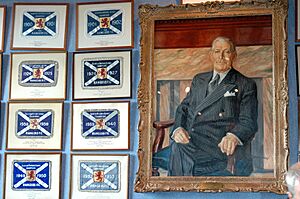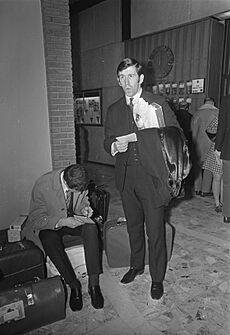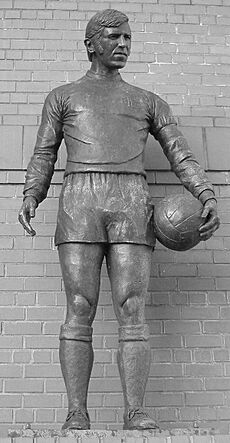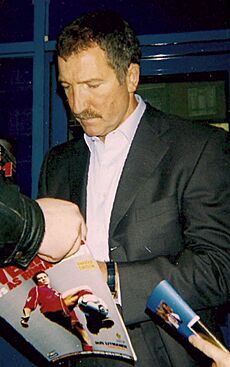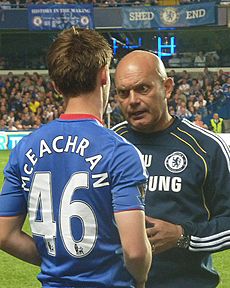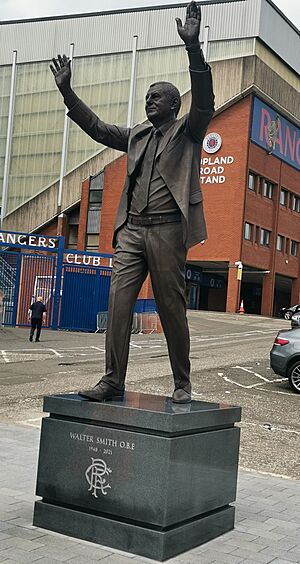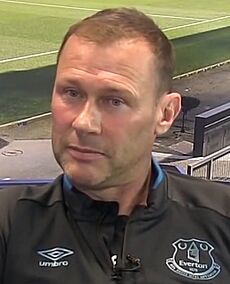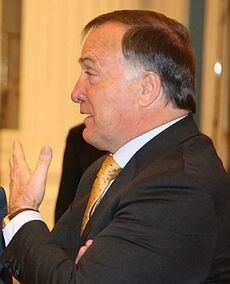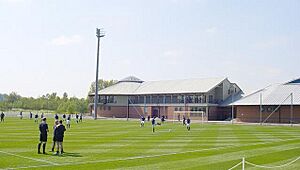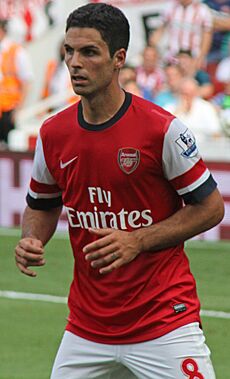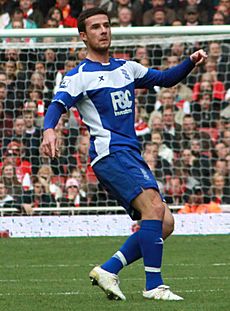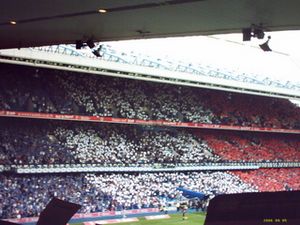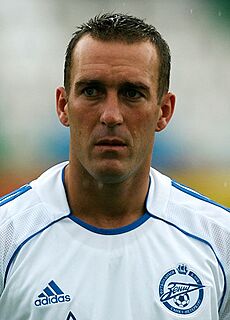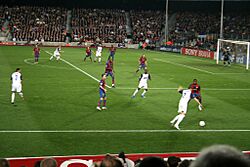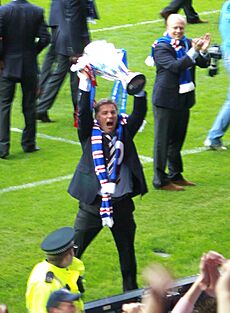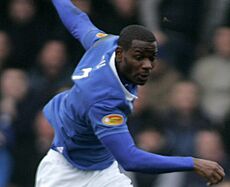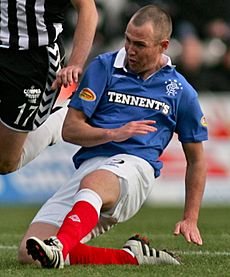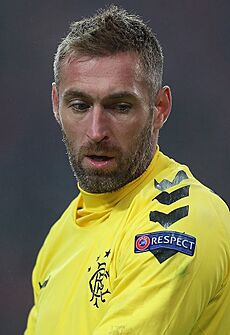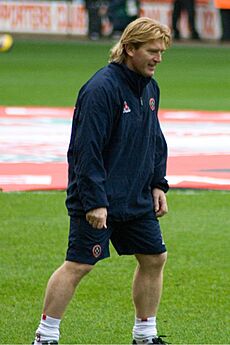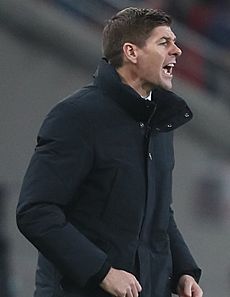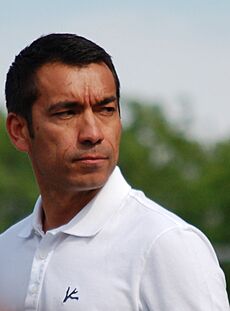History of Rangers F.C. facts for kids
Rangers Football Club, started in 1872, is one of Scotland's oldest football teams. It was the first club in the world to win more than 50 national league titles, with 55 wins by 2021. This makes them the second most successful club globally in terms of trophies, just behind Al Ahly from Egypt.
This article shares the story of Rangers, from their early days to winning the European Cup Winners' Cup. It also covers sad events like the Ibrox stadium disasters in 1902 and 1971. You'll learn about their amazing "nine-in-a-row" league championship streak and how they faced money troubles in the early 2010s. Finally, it talks about their return to winning the top league title in 2021.
Contents
- How Rangers Started (1872–1899)
- The Wilton Years (1899–1920)
- Struth's Time as Manager (1920–1954)
- Under Symon (1954–1967)
- Waddell Era: European Success and Sad Events (1969–1972)
- Wallace Becomes Manager (1972–1978)
- John Greig, From Captain to Manager (1978–1983)
- Wallace Returns (1983–1986)
- The Souness Revolution (1986–1991)
- Smith's Time as Manager (1991–1998)
- The Little General (1998–2001)
- Financial Challenges Under McLeish (2001–2006)
- Paul Le Guen (2006–2007)
- Smith's Return (2007–2011)
- McCoist's Time, Financial Troubles, and Rebuilding (2011–2015)
- Boardroom Changes and Return to the Top (2015–2021)
- Gio's Return (2021–2022)
How Rangers Started (1872–1899)
In March 1872, a group of friends who loved rowing decided to form a football club. These friends were brothers Moses and Peter McNeil, Peter Campbell, William McBeath, and David Hill. They named their new team Rangers. Moses McNeil got the idea for the name from a book about English rugby, where he saw "Swindon Rangers."
Rangers played their very first game in May 1872. It was a 0-0 draw against a team called Callander on Glasgow Green's Flesher's Haugh. In their second game, wearing light-blue shirts, they won a huge 11-0 against a team named Clyde.
By 1875, Rangers moved to Burnbank Park. The club started to become more organized. In 1876, Moses McNeil was chosen to play for Scotland against Wales, becoming Rangers' first international player. In 1883, Rangers was one of the six founding members of the Glasgow Football Association.
A famous rivalry began in 1888 when Rangers played Celtic for the first time in a friendly match. Celtic won that game 5-2. This match started what is now known as the "Old Firm" rivalry.
The Scottish Football League began in the 1890-91 season, and Rangers was one of the ten original teams. By this time, Rangers were playing at their first Ibrox Stadium. Their first league game was a 5-2 win against Heart of Midlothian on August 16, 1890. Rangers ended up sharing the first league title with Dumbarton after a play-off game ended in a 2-2 draw. This was the first of Rangers' record-breaking 55 championships.
Rangers lost their first two Scottish Cup Finals in 1877 and 1879. But they finally won the trophy in 1894, beating Celtic 3-1. They also won the Scottish Cup again in 1897 and 1898.
The Wilton Years (1899–1920)
On May 27, 1899, Rangers officially became a company. William Wilton, who was the club's match secretary, became their first manager. The current Ibrox Stadium was built that same year.
Rangers became very strong at the start of the 1900s. They won the championship seven times between 1900 and 1918, including four times in a row. In the 1898-99 season, Rangers won all eighteen of their league games, a perfect record that has not been repeated.
Between 1902 and 1910, Celtic became very dominant. In 1909, Rangers had a chance to stop Celtic from winning both the league and cup. However, the Scottish FA withheld the cup because fans invaded the pitch. Both clubs had to pay Queen's Park for the damage caused by the fans.
After losing the title in 1919, Rangers had one of their best seasons in 1920. Wilton and his assistant, Bill Struth, won the title again, with the team scoring 106 goals in 42 league games.
Sadly, William Wilton died in a boating accident in May 1920. Bill Struth then took over as manager.
Struth's Time as Manager (1920–1954)
A big highlight of the 1930s was Rangers winning the Scottish Cup three times in a row, from 1934 to 1936. In 1937, they lost in the first round of the cup to Queen of the South. This game was the first Rangers match ever recorded on film.
After World War II, Rangers became very successful. In 1947, there was a big change in the club's leadership. The board, which was made up of former players, wanted 71-year-old Struth to retire. But the chairman, James Bowie, was forced out instead.
Bill Struth led Rangers to 18 league championships, 10 Scottish Cups, and 2 League Cups during his 34 years as manager. He was the first manager in Scottish football to win the domestic treble (winning the league, Scottish Cup, and League Cup in one season) in 1948-49. This success was built on a strong defense known as the "Iron Curtain."
Under Struth, Rangers also set a record by winning nine league championships in a row. Seven of these were during wartime and were considered unofficial.
After winning two more domestic doubles in 1950 and 1953, Bill Struth retired. Scot Symon became Rangers' third manager on June 15, 1954.
Under Symon (1954–1967)
Scot Symon continued Rangers' winning ways. He led the team to six league championships, five Scottish Cups, and four League Cups. He also became the second manager to win the domestic treble in the 1963-64 season. Rangers had a great period from 1957 to 1965, winning four league titles and four cups. Jim Baxter was a very famous Rangers player during this time.
Jim Baxter left in 1965, but John Greig stepped up to fill his shoes. Even though Celtic had more European success at the end of the 1960s, Rangers were building for future wins.
In the 1956-57 season, Symon took Rangers into the European Cup for the first time, but they were quickly knocked out by Nice. The next season, Rangers suffered their biggest defeat against Celtic, losing 7-1 in the 1957 League Cup Final.
Rangers reached the semi-finals of the European Cup in 1960, losing to Eintracht Frankfurt. In 1961, Rangers became the first British team to reach a European final. They played in the Cup Winners' Cup Final against Fiorentina but lost. Rangers reached the final again in 1967, losing 1-0 to Bayern Munich after extra time.
In October 1967, Symon left his role as manager. His assistant, Davie White, took over.
Waddell Era: European Success and Sad Events (1969–1972)
Willie Waddell, a former Rangers player, became manager in November 1969. He brought new discipline to the team. In 1972, he led Rangers to their first and only European trophy. They beat Dynamo Moscow 3-2 in the Cup Winners' Cup final in Barcelona. Because fans ran onto the pitch after the game, the team received their trophy in the dressing room. UEFA also banned Rangers from defending the cup the next season.
Just weeks after this European win, Waddell became a general manager. His coach, Jock Wallace, became the new manager. Waddell wanted to focus on rebuilding Ibrox Stadium after the terrible 1971 Ibrox disaster, where 66 people died. He had worked closely with the victims' families and wanted to complete the stadium's reconstruction.
Wallace Becomes Manager (1972–1978)
Jock Wallace's time as Rangers manager was very successful. His first season, 1972-73, was the club's 100th year. Wallace changed the team, bringing in new players like Quinton Young and Tom Forsyth.
After a slow start, Rangers played much better. They only lost one league game from October to the end of the season. However, they still finished second to Celtic by just one point.
In the Scottish Cup, Rangers beat Celtic 3-2 in the final. Over 122,000 fans watched this game, and Princess Alexandra was also there. It was Rangers' first Scottish Cup win in seven years.
The 1972-73 season also saw the first European Super Cup. Rangers played Ajax, the European Cup holders, in January 1973. Ajax won 6-3 over two games.
In 1974-75, Rangers ended Celtic's nine-year winning streak in the league. Rangers also won the first Scottish Premier Division title as part of a domestic treble (winning the league, Scottish Cup, and League Cup).
Jock Wallace led the club to its fourth domestic treble, and their second in three years, in 1977-78. Rangers spent a lot of money on new players like Davie Cooper and Gordon Smith. Even with new players, Rangers had a tough start to the league season. But they fought back and won the title.
They won the League Cup by beating Celtic 2-1 after extra time. Then, they won the Scottish Cup by beating Aberdeen 2-1. This made Wallace the only Rangers manager to win two domestic trebles. Despite this great success, Wallace suddenly resigned on May 23, 1978. It's believed he had disagreements with general manager William Waddell about spending money on new players versus rebuilding the stadium.
With Wallace's departure, Rangers turned to another former player, John Greig, to be the new manager.
John Greig, From Captain to Manager (1978–1983)
After Jock Wallace left, John Greig, who was the team captain, became Rangers' new manager on May 24, 1978.
In the 1978-79 season, Rangers almost won four trophies! They ended up winning two domestic cups. They beat Juventus in the European Cup, which was a big achievement. But they lost to Cologne in the quarter-finals.
Their league form was not great at the start, and they finished second behind Celtic. However, Greig found success in the cup competitions. They won the 1979 Scottish Cup Final against Hibernian after two replays. They also won the 1979 Scottish League Cup Final, beating Aberdeen 2-1.
The next season, 1979-80, Rangers didn't win any trophies. They finished fifth in the league. They reached the 1980 Scottish Cup Final but lost to Celtic.
In the summer of 1980, Greig brought in new players like Jim Bett and Colin McAdam. The team started the season with a 15-game unbeaten run. But they couldn't keep it up and finished third in the league. They did win the 1981 Scottish Cup Final, beating Dundee United 4-1 in a replay.
Greig's fourth season, 1981-82, also ended without a league championship. They finished third. They lost the 1982 Scottish Cup Final 4-1 to Aberdeen. But they won the 1982 Scottish League Cup Final, beating Dundee United 2-1.
In 1982-83, Greig made more big signings, hoping to win the title. But the season ended without any trophies. They lost the 1983 Scottish Cup Final to Aberdeen.
The 1983-84 season was John Greig's last as manager. After a poor start to the league season, Greig resigned on October 28, 1983. During his time, fewer fans came to Ibrox games.
Wallace Returns (1983–1986)
Rangers brought Jock Wallace back to the club in November 1983. Wallace quickly improved the team's spirit and fitness. He also brought in new coaching staff and players.
Wallace's first game back was a 3-0 loss to Aberdeen. But after that, Rangers went on a 22-match unbeaten run. They finished fourth in the league. However, they did win a trophy: the League Cup. They beat Celtic 3-2 in the final, with Ally McCoist scoring three goals.
In the 1984-85 season, Rangers again finished fourth in the league. But they won the Scottish League Cup for the second season in a row, beating Dundee United 1-0.
Wallace resigned as manager on April 7, 1986. He left because the club's league form was not improving, and other teams like Aberdeen, Dundee United, and Celtic were very strong. Rangers finished fifth in the league in the 1985-86 season.
The Souness Revolution (1986–1991)
On April 7, 1986, Graeme Souness became Rangers' first player-manager. He joined from Sampdoria in Italy for £300,000. This was the first of many big money transfers for Rangers. Souness brought Walter Smith in as his assistant.
Souness's first game in charge was on May 3, 1986. Rangers beat Motherwell 2-0. Six days later, Souness won his first trophy, the Glasgow Cup, beating Celtic 3-2.
Souness spent a lot of money on new players, especially from English clubs. English teams were banned from European competitions at the time, so Souness could attract top talent. He signed international players like Chris Woods, Terry Butcher, and Jimmy Nicholl.
The 1986-87 season was a big success. Rangers finished first in the Scottish Premier Division for the first time in eight seasons. They won 31 games and lost only 5. Souness also won the 1986 Scottish League Cup Final, beating Celtic 2-1. Goalkeeper Chris Woods set a British record with 1,196 minutes without letting in a goal.
The next season, Rangers signed more big names like Trevor Francis, Ray Wilkins, and Richard Gough, who became Scotland's first £1 million player. But they finished third in the league. They did win the 1987 Scottish League Cup Final against Aberdeen.
The 1988-89 season started one of Rangers' most successful periods. Souness's team won the league championship, which was the first of nine titles in a row. They spent a lot of money on players like Gary Stevens and Kevin Drinkell.
Rangers were unbeaten in August and September, including a 5-1 win over Celtic. They won the League Cup again, beating Aberdeen. They almost won the treble but lost to Celtic in the Scottish Cup Final.
In 1988, businessman David Murray bought Rangers for £6 million. He became chairman in 1989 and continued to invest heavily in the team. On July 10, 1989, Rangers signed former Celtic striker Mo Johnston for £1.5 million. This was a huge story because Rangers had a history of not signing Catholic players, and Johnston had almost rejoined Celtic.
Johnston scored a crucial winning goal against Celtic in November 1989, which helped fans forgive him. In May 1990, Rangers won the league title again. But they lost to Celtic in the Scottish Cup and to Aberdeen in the League Cup Final.
The 1990-91 season was Souness's last. He left for Liverpool on April 16, 1991. Rangers won their third championship in a row on the final day of the season, with Souness's assistant Walter Smith in charge. Souness never won the Scottish Cup with Rangers.
Smith's Time as Manager (1991–1998)
Walter Smith became Rangers' ninth manager on April 19, 1991. He led the team to a dramatic league championship win on the final day of the season against Aberdeen.
In his first full season, Smith made changes to the team. He brought in Andy Goram, Alexei Mikhailichenko, and Stuart McCall. With financial support from David Murray, Rangers won their fourth championship in a row, scoring 101 goals. They also won the 1992 Scottish Cup Final, beating Airdrieonians 2-1.
The 1992-93 season was one of the most successful in the club's history. Rangers won the domestic treble (league, Scottish Cup, and League Cup). They also came very close to reaching the UEFA Champions League final. They beat English champions Leeds United in a famous match called the "Battle of Britain." In the group stage, Rangers were undefeated but still went out.
In July 1993, Duncan Ferguson became Britain's most expensive footballer when he joined Rangers for £4 million.
Rangers won the league and League Cup the next season but lost the 1994 Scottish Cup Final to Dundee United.
In the 1994-95 season, Rangers signed Basile Boli and Brian Laudrup for big fees. They won their sixth championship in a row, finishing 15 points ahead of Motherwell.
Rangers won the championship again in 1995-96 with the help of Paul Gascoigne. He made a big impact, scoring a hat-trick against Aberdeen to win the league. Rangers also won the 1996 Scottish Cup, beating Hearts 5-1.
In 1996-97, Rangers won their ninth championship in a row, matching Celtic's record. They also won the League Cup, beating Hearts 4-3.
The 1997-98 season was Walter Smith's last. Rangers tried to win a record tenth-straight league championship but finished second to Celtic by two points. The club ended the season without any trophies. Smith left Rangers to join Everton. Many key players from the "nine-in-a-row" era also left the club.
The Little General (1998–2001)
Dick Advocaat, nicknamed "the Little General," became Rangers' tenth manager on June 1, 1998. He was the first non-Scottish manager. The club wanted to challenge Europe's top teams. David Murray gave Advocaat a huge budget to buy new players.
In his first season, Advocaat spent over £36 million on new players. Rangers won another domestic treble. They also had a promising run in the UEFA Cup.
The next season, Advocaat continued to spend big, bringing in players like Michael Mols and Claudio Reyna. Rangers won a domestic double (league and one cup). They also showed improvement in the Champions League, reaching the group stages.
In Advocaat's third season, Rangers qualified for the Champions League group stage again. But their league performances started to decline. Even with expensive signings like Tore André Flo (£12 million) and Ronald de Boer, they couldn't stop the slide. Rangers failed to win a major trophy in the 2000-01 season as Celtic won everything. Advocaat resigned as manager in December 2001 and took on a general-manager role for a short time. Alex McLeish was appointed the new Rangers manager.
Murray Park, a £14 million training complex, was built to help the club develop young players and compete with European teams.
Financial Challenges Under McLeish (2001–2006)
Alex McLeish became Rangers' eleventh manager. In his first half-season, 2001-02, Rangers won a Scottish Cup and League Cup double. This included a thrilling 3-2 win over Celtic in the 2002 Scottish Cup Final, with Peter Løvenkrands scoring a last-minute winner.
In McLeish's first full season, 2002-03, Rangers won their seventh domestic treble. The Scottish Premier League title was won on the very last day of the season. Rangers and Celtic were tied on points, but Rangers had a better goal difference. Rangers won their final game 6-1 against Dunfermline, and a last-minute penalty by Mikel Arteta secured the title.
They won the 2003 Scottish League Cup Final against Celtic in March. Then, they won the 2003 Scottish Cup Final against Dundee in May. This was a fantastic start for McLeish, but they had a poor showing in Europe, exiting early.
The next season, things became difficult for McLeish. The club was facing big financial problems because of the huge spending during the Advocaat era. Rangers had to cut costs and reduce their debt. McLeish had to rebuild the team without much money for transfers. Key players like Lorenzo Amoruso and Barry Ferguson left. McLeish had to rely on free transfers and loan signings.
The 2003-04 season started well, with Rangers topping the league and qualifying for the Champions League. But results quickly got worse, and they ended the season without a trophy.
The 2004-05 season also started slowly. But then, new players like Nacho Novo, Dado Pršo, and Jean-Alain Boumsong arrived. Boumsong was a big success but was sold to Newcastle United for £8 million in January 2005. This money allowed for more signings, including Thomas Buffel and the return of Barry Ferguson.
In March 2005, Rangers won the Scottish League Cup Final, beating Motherwell 5-1. The league title seemed lost, but Rangers kept winning. Celtic then lost a game, bringing Rangers back into the title race. On the final day of the season, Rangers needed to win at Hibernian and hope Celtic dropped points. In a dramatic finish, Motherwell beat Celtic, while Rangers won their game. The league trophy, which was on its way to Motherwell, had to turn around and fly to Edinburgh. This day became known as "Helicopter Sunday," and McLeish celebrated his second league title.
The 2005-06 season was tough. Rangers had a terrible run of ten games without a win. However, they became the first Scottish team to reach the knockout stages of the Champions League. Despite this, fans were unhappy with their league form.
In February 2006, it was announced that McLeish would leave at the end of the season. Paul Le Guen was confirmed as the new manager in March.
Paul Le Guen (2006–2007)
David Murray, the chairman, had high hopes for Paul Le Guen, promising him significant money to strengthen the team. Le Guen was known for finding and developing young talent. In the summer of 2006, he signed eleven new players, including Filip Šebo for a large fee. He also let experienced players like Alex Rae and Peter Løvenkrands leave.
Rangers' first competitive game under Le Guen was a 2-1 win against Motherwell. But their league form was inconsistent. By mid-November, they were 15 points behind Celtic. They were also knocked out of the League Cup by St Johnstone, which led to many calls for Le Guen to leave.
Despite poor domestic results, Rangers became the first Scottish club to qualify from the UEFA Cup group stage in December 2006. However, Le Guen had a disagreement with captain Barry Ferguson and removed him from the captaincy.
On January 4, 2007, Le Guen left Rangers by mutual agreement. He was the club's shortest-serving manager.
Smith's Return (2007–2011)
On January 10, 2007, Walter Smith returned as Rangers manager, with Ally McCoist as his assistant. Smith made important changes, signing experienced defenders like David Weir.
The next summer, Smith made ten new signings, including Carlos Cuéllar and Lee McCulloch. Rangers qualified for the Champions League group stage. They had a good start, beating Stuttgart and Lyon, and drawing with Barcelona. They eventually reached the UEFA Cup final in Manchester but lost 2-0 to Zenit St. Petersburg. The match was unfortunately affected by serious disturbances caused by a small number of Rangers fans.
In the Scottish Premier League, the title race went down to the final day. Rangers had been 10 points ahead in March but lost their lead and finished second to Celtic.
Rangers won the League Cup in March 2008, beating Dundee United on penalties. They also reached the 2008 Scottish Cup Final, their 50th appearance. They won the final 3-2 against Queen of the South.
The 2008-09 season started with an early exit from the Champions League, which had financial consequences. The club faced losses and tried to cut costs.
Rangers won the first Old Firm game of the season 4-2. After some ups and downs, Rangers took the lead in the league in February 2009. They won the league title on the final day, beating Dundee United 3-0, securing their 52nd league championship.
Rangers reached both domestic cup finals again. They lost the 2009 Scottish League Cup Final 2-0 to Celtic after extra time. But they won the 2009 Scottish Cup Final 1-0 against Falkirk, completing a domestic double.
The next season, Rangers continued to face financial problems. They had to let many players go and only signed Jérôme Rothen on loan. Chairman David Murray stepped down, and Alastair Johnston took over. Walter Smith said that the bank was "effectively running the club" due to the debt.
Despite the financial issues, Rangers' league title defense started well. They won the first Old Firm game 3-1. They went on a six-match winning run and were top of the league at the start of 2010. An injury-time winner from Maurice Edu in the third Old Firm match helped secure the title. On April 25, Rangers won their 53rd league title, beating Hibernian 1-0.
In the cups, Rangers won the League Cup, beating St Mirren 1-0, even though they had two players sent off. But they lost to Dundee United in the Scottish Cup quarter-finals.
Rangers qualified for the Champions League group stage. They drew with Stuttgart and Unirea, but finished bottom of their group. UEFA fined them for fan disturbances.
In 2010, more players left due to financial problems. Walter Smith signed Nikica Jelavić. Rangers and Celtic both started the season with eight league wins in a row. Rangers won the first Old Firm game 3-1. After some close matches, Rangers won their 54th league championship on May 15, 2011.
In the cups, Rangers won the League Cup, beating Celtic 2-1 after extra time. But they lost to Celtic in the Scottish Cup.
In Europe, Rangers qualified for the Champions League group stages again. They drew with Manchester United and Valencia. They finished third in their group, which meant they moved to the Europa League. They reached the last sixteen of the Europa League but lost to PSV Eindhoven.
On May 6, 2011, David Murray sold his majority ownership in the club for £1 to businessman Craig Whyte.
McCoist's Time, Financial Troubles, and Rebuilding (2011–2015)
Ally McCoist, Rangers' record goalscorer, became manager for the 2011-12 season. The club faced problems with transfers under the new owner, Craig Whyte. Rangers were knocked out of both the Champions League and Europa League by August, losing important income.
On February 13, 2012, Rangers announced their intention to appoint administrators due to unpaid taxes. They officially entered administration the next day. This meant the team was docked ten points by the SPL, effectively ending their title challenge. They also couldn't play in European football for the 2012-13 season. By April, the club's total debts were reported to be as high as £134 million.
On June 12, the tax authorities rejected a plan to help the club exit administration. This meant the company that owned Rangers went into liquidation. The club's business and assets were sold to a new company led by Charles Green, which was later renamed The Rangers Football Club Ltd.
Most of the other SPL clubs voted against allowing Rangers to transfer their league membership to the new company. So, Rangers had to apply to join the Scottish Football League. On July 13, 29 out of 30 SFL clubs voted to place Rangers in the Third Division, the lowest tier of Scottish football. Rangers won the Third Division title on March 30, 2013.
In the 2013-14 season, Rangers won their first 15 games in League One. They reached the Ramsden's Cup Final but lost. On May 3, 2014, Rangers made history by going an entire league season unbeaten, winning the Scottish League One championship.
The club faced constant changes in its leadership. Mike Ashley became the main owner in late 2014. Fans showed their unhappiness by holding up red cards at games. It was also reported that Ashley had bought the naming rights to Ibrox Stadium for just £1.
Rangers continued to struggle financially. Offers of funding from Dave King were rejected in favor of a £2 million loan from Mike Ashley. This gave Ashley more power at the club. The Scottish Football Association (SFA) investigated Ashley for breaking rules about owning more than one club.
On the field, Rangers lost their first league game to Hearts. They reached the League Cup semi-final, setting up the first Old Firm derby in two years. But their title challenge ended in November. Ally McCoist became unhappy with staff losing their jobs and resigned on December 12. His assistant, Kenny McDowall, became interim manager.
Boardroom Changes and Return to the Top (2015–2021)
In early 2015, Mike Ashley's control over Rangers weakened. A group led by Dave King bought shares and took control of the board.
In February, the SFA fined Ashley for breaking rules on dual ownership. The club was also fined for its lack of proper management. The outcome of a special meeting in March was a big win for King's group. Derek Llambias and Barry Leach were removed from the board and replaced by King, Paul Murray, and John Giligan.
After poor results, Stuart McCall became interim manager. It was revealed that five loan players from Newcastle United were signed without medical checks. Rangers failed to get promoted to the Premiership automatically. They had to play six play-off matches but lost to Motherwell. After the final play-off game, there was a fight on the pitch between a Rangers player and a Motherwell player.
The police investigated Mike Ashley's role in the Rangers takeover. In May, Dave King was approved by the SFA and became chairman. He also loaned the club more money. John Greig was named honorary president.
2015–16 Season
In June, shareholders voted to change retail agreements with Sports Direct. The club also appointed Stewart Robertson as managing director.
In November 2015, Rangers announced a loss of £7.5 million. This meant they needed more money to cover expenses. A court ruled that the previous owner's use of employee benefit trusts broke tax rules.
Mike Ashley continued legal challenges against Dave King and the SFA. However, his attempts to have King jailed were dismissed.
At the annual general meeting, chairman Dave King announced that Rangers would pay a living wage to employees and repay a £5 million loan from Sports Direct. The loan was repaid in full by Christmas Eve, using £6.5 million borrowed from King and others. In February, Rangers announced they wanted to end their retail deal with Sports Direct.
On the football side, Mark Warburton became the new manager in June. Rangers started the season with eleven straight wins. This helped Warburton break Bill Struth's record for consecutive wins at the start of a manager's time at Ibrox. They won the first eleven league games, giving them an eight-point lead.
Rangers secured the league crown on April 5, 2016. They also won the Challenge Cup, beating Peterhead 4-0. In the Scottish Cup, they beat Celtic in the semi-final on penalties. However, they lost the 2016 Scottish Cup Final to Hibernian, who scored a late winner. The Hibs fans invaded the pitch, leading to disorder and assaults on Rangers players.
2016–17 Season
Rangers signed Joey Barton, Jordan Rossiter, and Niko Kranjčar in May. Mark Warburton and David Weir signed new contracts. Warburton brought in eleven new players, including Joe Garner for over a million pounds.
The Scottish Challenge Cup was expanded to include teams from Wales and Northern Ireland. Rangers' under-20s team played in the competition.
The senior team started the season in the League Cup. They reached the semi-final but lost to Celtic. Their league form was poor, including a 5-1 defeat to Celtic. Midfielder Joey Barton was suspended after an argument with Andy Halliday. He was also charged by the SFA for gambling on football matches. Barton eventually left the club by mutual agreement in November.
Rangers' form improved in December. But on February 10, 2017, manager Mark Warburton, assistant David Weir, and Frank McParland left Rangers. Graeme Murty became caretaker manager. The club announced they would look for a Director of Football and a new manager.
Graeme Murty's time in charge started with a Scottish Cup win. But league form remained inconsistent. On March 11, Pedro Caixinha was confirmed as Rangers' sixteenth manager.
The club also started legal action against former executives and Mike Ashley regarding retail deals.
2017–18 Season
Rangers were knocked out of the Europa League in the first qualifying round by Progrès Niederkorn. Their league campaign started slowly. They lost to Motherwell in the League Cup semi-finals. Pedro Caixinha was sacked in October. Graeme Murty became caretaker manager again.
Rangers finished third in the Premiership. They lost to Celtic in the Scottish Cup semi-finals. Murty was sacked in May. Ryan Jack and Alfredo Morelos joined the club. Morelos was the joint-top scorer with 18 goals.
2018–19 Season
In the summer, Rangers chairman Dave King convinced former Liverpool captain Steven Gerrard to become manager. New players included Scott Arfield, Allan McGregor, Connor Goldson, and Borna Barišić. Ryan Kent, Jermain Defoe, and Steven Davis joined on loan.
Rangers finished second in the Premiership, nine points behind Celtic. They reached the Scottish Cup quarter-finals and the League Cup semi-finals. They qualified for the Europa League group stage but didn't advance to the knockout phase.
Alfredo Morelos was the club's top scorer again, with 30 goals.
2019–20 Season
Steven Gerrard's second season began with Steven Davis and Joe Aribo joining permanently. Ryan Kent also made his loan move permanent.
After an unbeaten pre-season, Rangers won their first three league games but lost 2-0 to Celtic. Celtic continued to lead the league and won their ninth title in a row. Celtic also beat Rangers in the Scottish League Cup Final. Rangers were knocked out of the Scottish Cup quarter-finals by Hearts.
Rangers reached the Europa League knockout phase, finishing second in their group. They were eliminated by Bayer Leverkusen in the round of 16.
Alfredo Morelos was the top scorer for the third season in a row, with 29 goals.
2020–21 Season
Douglas Park became Rangers chairman. New players included Ianis Hagi, Calvin Bassey, Jermain Defoe, and Kemar Roofe.
Rangers finished the league season unbeaten, including a 15-game winning streak. They prevented Celtic from winning ten titles in a row, finishing 25 points ahead. This was Steven Gerrard's first trophy as manager. Rangers reached the quarter-finals of both domestic cup competitions.
The club qualified for the Europa League group stage for the third season in a row. They won their group and reached the round of 16 but lost to SK Slavia Prague.
Club captain James Tavernier was the top scorer with 19 goals.
Gio's Return (2021–2022)
Steven Gerrard left Rangers to become manager of Aston Villa in November. Rangers received about £4 million for his release.
Sadly, Walter Smith, who managed Rangers twice, passed away at age 73. He led Rangers to ten championships and many cup wins.
Former Rangers midfielder, Giovanni van Bronckhorst, became Gerrard's replacement eleven days later. He was the club's eighteenth manager.
Rangers finished second in the Premiership, four points behind Celtic.
The club reached the final of the Europa League but lost 5-4 on penalties to Eintracht Frankfurt.
They were knocked out of the League Cup by Hibs in the semi-finals. However, they won the Scottish Cup, beating Hearts 2-0 after extra time. This was van Bronckhorst's first trophy as manager and Rangers' 34th Scottish Cup success, their first in 13 years.
 | Jewel Prestage |
 | Ella Baker |
 | Fannie Lou Hamer |


